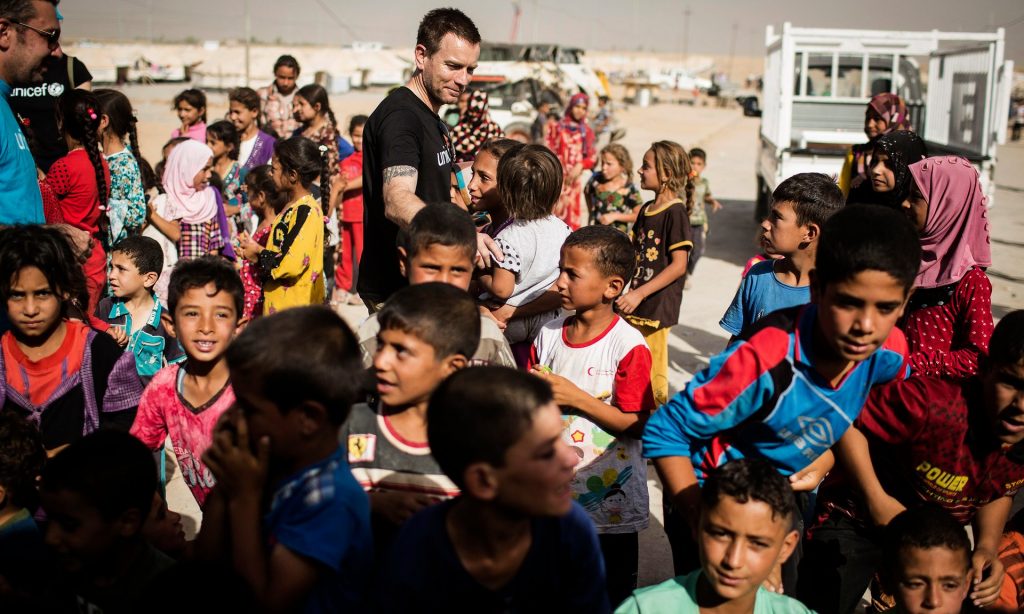
Photograph: Siegfried Modola/Unicef/PA
Aid agencies are warning that northern Iraq is in dire need of support due to a renewed offensive in the area, a funding slowdown and the threat of more attacks on the region’s cities, which are likely to result in hundreds of thousands more people being displaced.
The UN said camps for displaced people are at full capacity, and without additional funding, the 1.5 million people expected to be caught up in renewed fighting around Mosul could be without aid.
Across Iraq, more than 3 million people have been displaced because of conflict and 10 million need humanitarian assistance. Since March, 40,000 people have been displaced from Mosul and the surrounding area.
The UN said it has received less than 40% of the $584m (£437m) it has requested to meet the needs of internally displaced people (IDPs) and refugees in the country.
Wednesday marks the second anniversary of Islamic State’s attack on Sinjar, which caused the displacement of an estimated 300,000 Yazidis, a persecuted ethnic minority who live in northern Iraq and Syria.
During the attack, about 40,000 people were stranded on Mount Sinjar for days. Others were taken hostage, including thousands of women and girls who were sold into slavery. The UN has said the attack on the Yazidis could amount to genocide. Thousands of Yazidis are still being held by Isis.
“The situation on the ground is quickly becoming desperate for many Syrian and Yazidi women living in camps and host communities,” said Mandana Hendessi, Iraq director for Women for Women International.
“Many women tell us their families are starving, they have no way to earn money, they are not safe, and they are struggling each day with the debilitating effects of extreme trauma. We are trying to help them address both their immediate and long-term needs.”
Louise Finan, Christian Aid’s Middle East advocacy officer, said there had been a stark decline in the humanitarian situation in the Mosul region.
“Two years on and the humanitarian situation in Iraq continues to deteriorate at an alarming rate. Today, for the 3.3 million Iraqis who have been forced to flee their homes, hope is fading fast of a return home or of being able to lead a normal life where they now are,” she said.
“The situation is likely to become much worse in the coming months as we see further displacement and growing need as fighting intensifies around Mosul, where it’s estimated that up to 1.5 million people will be affected,” said Finan.
“The international community needs to step up and provide the necessary funding to ensure this does not become a catastrophe, and those who have been displaced and in need for over two years now deserve to be able to get on with their lives and that of their children.”
A Christian Aid partner in Iraq, Reach (Rehabilitation, Education and Community Health), is providing food packages, hygiene kits and psychological support to help people deal with the trauma of conflict and displacement.
Another partner, Asuda, is providing medical support and counselling to vulnerable women.
Last year, Germany issued 1,100 extra visas for Yazidis, and is providing specialist psychiatric support and medical help to Yazidi women and children who escaped Isis.
Last week, the actor Ewan McGregor visited Debaga refugee camp in northern Iraq with the UN children’s fund, Unicef, to raise the profile of those who have been displaced.
Over just a few days in June, 3,000 people arrived at the camp, pushing the number staying in its small reception centre to seven times its capacity.
“The world is facing an unprecedented refugee crisis and we must do more to protect the extraordinary number of children who have been torn from their homes by violent conflict,” said McGregor. “It’s up to us to tell our friends, our neighbours and our governments that refugees are welcome.”
A spokeswoman for the UN refugee agency, UNHCR, said there were “few latrines, and drinking water [was] in short supply”.
“It is estimated that more than a million people still live in Mosul and any large offensive against the city could result in the displacement of up to 600,000 more people,” she said.

